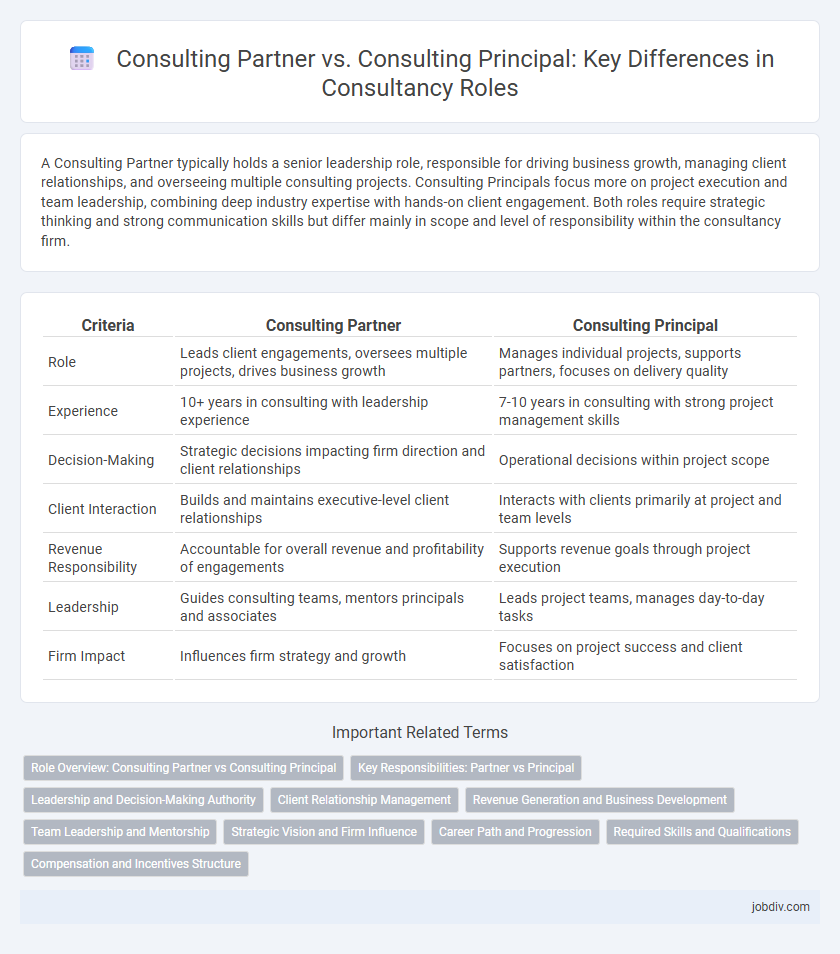A Consulting Partner typically holds a senior leadership role, responsible for driving business growth, managing client relationships, and overseeing multiple consulting projects. Consulting Principals focus more on project execution and team leadership, combining deep industry expertise with hands-on client engagement. Both roles require strategic thinking and strong communication skills but differ mainly in scope and level of responsibility within the consultancy firm.
Table of Comparison
| Criteria | Consulting Partner | Consulting Principal |
|---|---|---|
| Role | Leads client engagements, oversees multiple projects, drives business growth | Manages individual projects, supports partners, focuses on delivery quality |
| Experience | 10+ years in consulting with leadership experience | 7-10 years in consulting with strong project management skills |
| Decision-Making | Strategic decisions impacting firm direction and client relationships | Operational decisions within project scope |
| Client Interaction | Builds and maintains executive-level client relationships | Interacts with clients primarily at project and team levels |
| Revenue Responsibility | Accountable for overall revenue and profitability of engagements | Supports revenue goals through project execution |
| Leadership | Guides consulting teams, mentors principals and associates | Leads project teams, manages day-to-day tasks |
| Firm Impact | Influences firm strategy and growth | Focuses on project success and client satisfaction |
Role Overview: Consulting Partner vs Consulting Principal
Consulting Partners are senior leaders responsible for driving business growth, managing client relationships, and overseeing multiple project teams to ensure strategic alignment and profitability. Consulting Principals focus on leading complex consulting engagements, delivering high-impact solutions, and mentoring project managers while contributing subject matter expertise in specialized domains. Both roles require strong leadership and client management skills, but Partners emphasize broader business development and organizational leadership compared to the Principals' hands-on engagement delivery and technical guidance.
Key Responsibilities: Partner vs Principal
Consulting Partners typically focus on high-level client relationship management, business development, and overall project oversight to drive firm growth and profitability. Consulting Principals concentrate more on leading complex projects, managing consulting teams, and delivering strategic solutions to meet client needs. Both roles require strong leadership and industry expertise, but Partners emphasize external client engagement while Principals prioritize internal project execution.
Leadership and Decision-Making Authority
Consulting Partners hold the highest leadership positions with significant decision-making authority, overseeing business strategy, client relationships, and firm growth. Consulting Principals lead project delivery and manage teams, exercising tactical decision-making within their engagements but reporting to Partners for strategic directions. The Partner role emphasizes long-term firm leadership, while the Principal focuses on operational leadership and execution.
Client Relationship Management
A Consulting Partner primarily drives client relationship management by overseeing multiple client accounts, ensuring strategic alignment, and securing long-term engagements that contribute to the firm's growth. The Consulting Principal focuses on deepening client trust through hands-on project leadership, delivering tailored solutions, and maintaining day-to-day communication to address client needs promptly. Both roles are crucial for fostering strong client partnerships, but the Partner emphasizes high-level relationship cultivation while the Principal manages operational client interactions.
Revenue Generation and Business Development
Consulting Partners primarily drive revenue generation by leveraging extensive client relationships and securing high-value contracts, while Consulting Principals focus on business development through crafting innovative service offerings and leading project delivery teams. Partners have a strategic role in identifying new market opportunities, directly impacting firm growth and profitability. Principals contribute by managing client engagements efficiently, ensuring project success that fosters repeat business and long-term partnerships.
Team Leadership and Mentorship
Consulting Partners drive overall strategic vision and business development while leading multiple client engagements and managing senior teams. Consulting Principals focus on direct team leadership and mentorship, guiding project managers and consultants to deliver high-quality client solutions. Both roles require strong leadership skills, but Principals emphasize hands-on coaching and skill development within project teams.
Strategic Vision and Firm Influence
A Consulting Partner typically embodies a broader strategic vision, steering firm-wide initiatives and driving long-term growth, while a Consulting Principal concentrates more on project-level leadership and client-specific strategies. Partners exert significant influence over firm direction, culture, and key decision-making processes, whereas Principals emphasize operational excellence and tactical execution within engagements. The Partner's role often integrates market positioning and firm reputation, positioning them as foundational architects of organizational strategy.
Career Path and Progression
A Consulting Partner typically leads client relationships, drives business development, and oversees project delivery, representing a senior leadership role within the consultancy. The Consulting Principal usually serves as a technical or functional expert, focusing on high-level problem-solving and mentoring teams, positioned as a stepping stone toward partnership. Career progression often moves from Principal to Partner by demonstrating strong client impact, strategic vision, and revenue growth capabilities.
Required Skills and Qualifications
Consulting Partners require extensive expertise in client relationship management, strategic business development, and leadership, often possessing advanced degrees such as an MBA alongside a decade or more of industry experience. Consulting Principals focus on deep technical knowledge, project execution, and team leadership, typically holding specialized certifications and around 7 to 10 years of hands-on consulting practice. Both roles demand strong communication skills, analytical thinking, and the ability to drive business growth, but Partners prioritize strategic oversight while Principals emphasize operational delivery.
Compensation and Incentives Structure
Consulting Partners typically receive a higher base salary combined with substantial profit-sharing incentives, reflecting their ownership stake and responsibility for firm growth and client acquisition. Consulting Principals often earn a competitive base salary supplemented by performance bonuses tied to project delivery and team management, emphasizing operational excellence over equity participation. The compensation structure for Partners aligns with long-term firm profitability, whereas Principals are incentivized primarily through short-term performance metrics and client satisfaction outcomes.
Consulting Partner vs Consulting Principal Infographic

 jobdiv.com
jobdiv.com